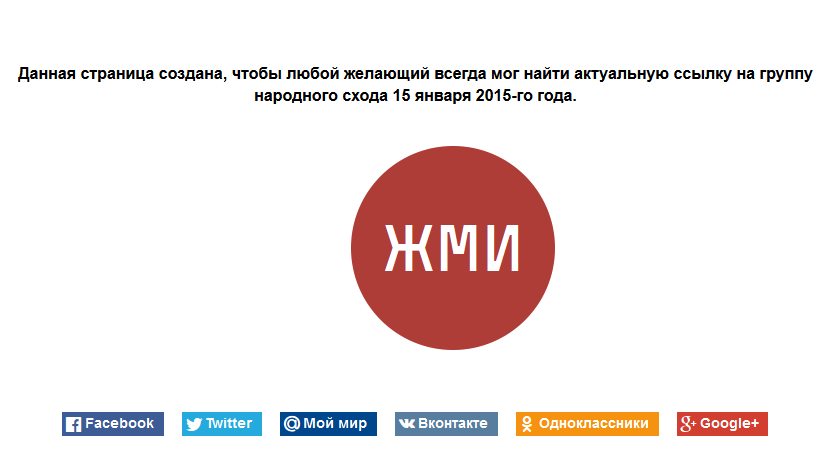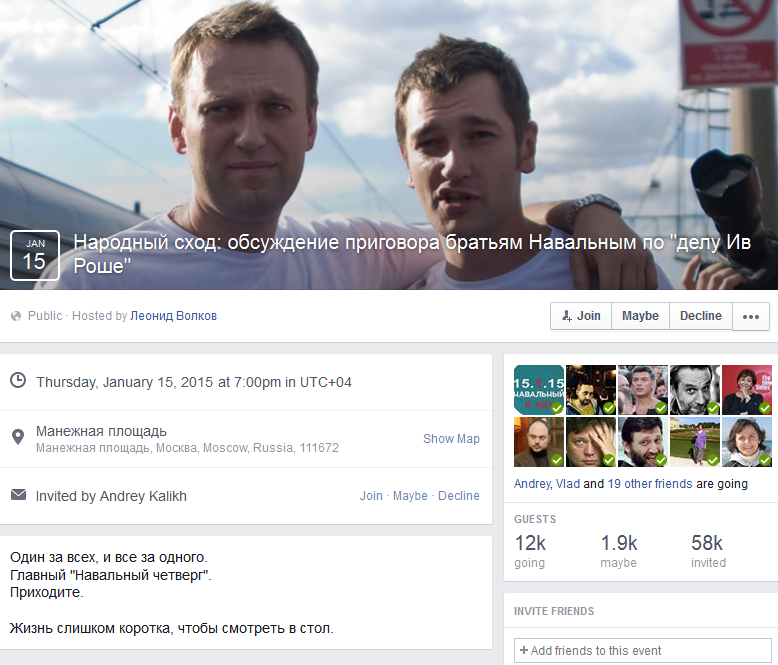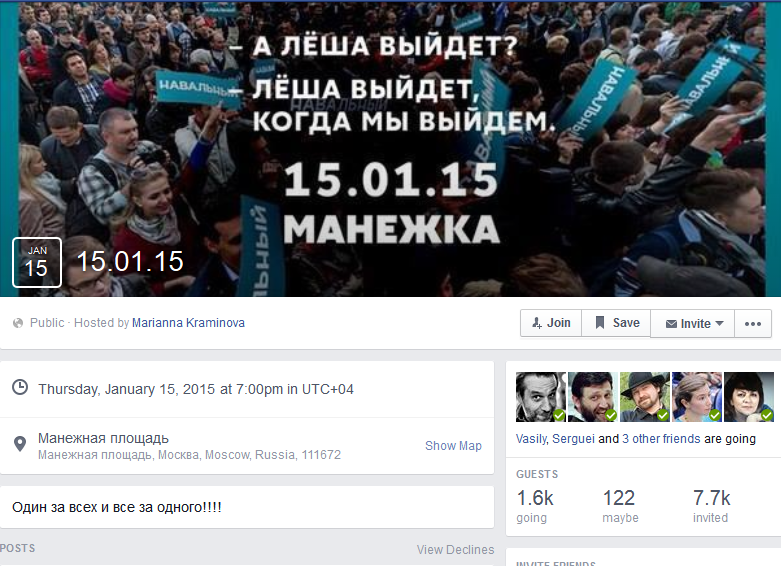Welcome to our column, Russia Update, where we will be closely following day-to-day developments in Russia, including the Russian government’s foreign and domestic policies.
The previous issue is here, and see also our Russia This Week story The Kremlin’s Policy-Making on Ukraine is ‘A Mess’ and special features ‘Managed Spring’: How Moscow Parted Easily with the ‘Novorossiya’ Leaders, Putin ‘The Imperialist’ A Runner-Up For Time’s ‘Person of the Year’ and It’s Not Just Oil and Sanctions Killing Russia’s Economy, It’s Putin.
Evidently at the request of Russian censors, Facebook blocked a page calling for an action in support of indicted opposition leader Alexey Navalny from viewing by Russian users inside Russia. Navalny faces a possible sentence of 10 years in prison on fabricated charges when the verdict is due to be read January 15, 2014. The censorship only led to Russians making another group and the news spread.
Please help The Interpreter to continue providing this valuable information service by making a donation towards our costsâ€.
UPDATES BELOW
TheRunet.ru, an online publication about the Russian Internet, has a rather feisty take on the year-end press conference held by President Vladimir Putin, where they have satirized the autocratic leader used Coubs — a Russian invention similar to Vines for posting snippets of video from iPhones to social media.
In this video, footage from the Kremlin propaganda outlet RT.com shows an angry Russian assistant having to turn over the microphone to a Ukrainian journalist from Unian who has been given the floor by Putin. The Coub, titled “Hate+Pain//(KILLFACE)” was made by a Ukrainian journalist for Hromadske TV.
The image has appeared in different forms on Russian media as viewers were shocked, then amused at how much venom the woman projected.
This Coub method borrows from Buzzfeed, a popular US website that has used gifs to satirize Putin itself in the past.
Other Coubs featured by TheRuNet.ru picked out Putin’s claim that he
doesn’t know what his own salary is; his laughter on certain topics; and his quip, “Why
did you let her at the microphone?” about Ksenya Sobchak, a popular
talk-show host who confronted Putin with a question about why Chechen
leader Ramzan Kadyrov was allowed to give orders to burn down the homes
of the relatives of terrorists.
Anti-corruption blogger Alexey Navalny, who has been on trial for fraud charges widely believed to be fabricated in retaliation for his activism, posted some clips from the three-and-a-half hour press conference that he said were the most worth watching.
Amond these was the question by Unian journalist Roman Tsimbalyuk, who was wearing a sweat-shirt with the word Ukrop and an image of a dill weed, which references a derogatory term for Ukrainians based on the Russian word for “dill,” which Ukrainians themselves have turned into a joke.
Translation by The Interpreter:
If you please, two brief questions. The first question is regarding the
punitive operation which you organized in the east of our country, in
fact largely against the Russian population. It’s no secret that Russian
servicemen are fighting there and Russian fighters who are staging all
this. So, question: How many of them have you sent there of these
Russian military, how much armor have you sent there, how many of them
died on Ukrainian territory. And you, as the Commander-in-Chief, what
will you say to the families of those who were killed, the officers and
soldiers?
And if possible, very briefly, the second question: We had a
president, his name was Viktor. He is now in hiding on the territory of
the Russian Federation. But at one time he put the head of the
Batkyvshchina Party [Yuliya Timoshenko] in jail. She served her time. Now, the number-one
person in the party list of Yuliya Timoshenko Bloc is imprisoned but now
in a Russian jail.So my question is, under what conditions will
you release the imprisoned pilot Savchenko, the Ukrainian director Oleg
Sentsov and as a minimum, the 30 Ukrainian POWs, which you are holding on
Russian territory in various pre-trial detention facilities. Thank you.
Putin replied that colleagues of the journalists who were killed in Ukraine
covering the war were sitting in the hall — and “are your colleagues in fact, too”:
I emphasize that these people did not take part in any
combat on either side. They were unarmed. And the obligations of all
state organizations, including military organizations are to preserve their
life and health, give them the opportunity to perform their duties for
the dissemination of objective, full information, at any rate, in the way
they see it. This is a universally-recognized fact in the civilized
world.These people were murdered. According to the information from our
law-enforcement agencies, the spotter during these murders was Ms. Savchenko.
While Putin’s sentiments sound worthy of
the Committee to Protect Journalists, a group that often challenges the
Kremlin’s impunity in the deaths of journalists, in fact, Putin has
delivered a highly tendentious claim.
The journalists were
embedded with Russian-backed separatists, travelling with fighters from
the self-declared “People’s Republic of Donetsk.” They were standing
near a checkpoint with armed fighters — a legitimate target in a war. A
shell had landed near a truck — but had not detonated. They went
toward the truck to look at it, and it blew up, killing the two
reporters, neither of who had on bullet-proof vests, and who were not
trained war correspondents. A third hid under a tank — and could hardly
expect this not to be a targeted vehicle.
Putin implies that he cannot interfere in Savchenko’s case because it will be reviewed by an independent judiciary. He said that if she were found innocent, she would be released immediately — which naturally should be expected, and not viewed as some form of magnanimity.
Yet the fact that Russian officials
have made the charge of “murder” already lets us know how dubious the
process is, because there is no evidence that journalists in a war zone
with combatants by a checkpoint were even visible, let alone deliberately targeted by the opposing side.
Putin said there were no POWs, but were detainees being investigated for terrorist activities.
For further remarks, see the English-language transcript at Kremlin.ru.
— Catherine A. Fitzpatrick
‘Facebook isn’t a helper to us anymore’ says a tweet and the headline of a blog post by Andrei Malgin (amalgin) a prominent Russian blogger with 12,400 followrs on Twitter and many thousands more on LiveJournal who himself has been forced to live abroad in Italy.
Both Russian exiles outside of Russia and opposition and human rights
activists inside Russia as well as Russian-speakers in neighboring countries have relied on Facebook to keep in touch with
each other in defiance of the Russian censor’s blockage of accounts on
the domestic social media platform VKontakte and critical news sites like
grani.ru.
Malgin quotes an Interfax story that says Facebook has restricted
access for Russian users to a page in which a meeting of supporters of
opposition member Alexey Navalny was being organized (translation The Interpreter):
A demand to
restrict access to Internet pages on Facebook in which calls to an
unauthorized mass event were made was received at Roskomnadzor [state
censor] from the Prosecutor General’s office, through the urgent
electronic form of cooperation, Vadim Ampelonsky, press secretary of
Roskomnadzor, told Interfax today.
He added that the demand was made under Law No. 398-F3.
“At the present time, the demand of the Prosecutor General’s office was being fulfilled.”
As we reported earlier today,
the page attracted at least 11,000 viewers who said they would attend
the “people’s assembly” on Manezh Square before it was blocked for those
viewing inside Russia. The page is still visible outside Russia, and
new pages have been created in Russia by supporters.
Navalny’s supporters have responded by making what they call a “Big Red Button” page
with the word in Russian “Press” where anyone can click and find a
dynamically-updating link to an uncensored page with the January 15
event listed.

While VKontakte has many more users in Russia than Facebook, Facebook
has attracted a significant number of Russian and Russian-language
speaking intellectuals, particularly critical of the government of
Vladimir Putin.
Now they feel more vulnerable — but they already had
cause to worry, as Facebook executives have been in secret talks with
the Russian government about complying with their new requirement to
store Russian customer data on servers on Russian soil. That makes it
more accessible to intelligence agencies.
— Catherine A. Fitzpatrick
Facebook has evidently blocked an event page started by Leonid Volkov for an
action in support of opposition leader Alexey Navalny, who faces the
verdict in his trial on fraud charges on January 15, 2015. The charges are widely believed to be fabricated in retaliation for his anti-corruption activity.
Volkov was careful to call the event “a people’s assembly” rather
than “rally” or “demonstration” to keep it from appearing to be a
violation of strict Russian laws on public protests — he did not plan
to seek a permit which likely would not have been given anyway.
Nothing in the event violates Facebook’s terms of services, yet
the US company blocked the page from the view of people inside Russia,
in compliance with a policy where they will respond to such requests
from law-enforcement.
The page “People’s Assembly 15.01.15” is still visible outside Russia and is only blocked for those who submitted a location or phone numbers inside Russia when they registered for Facebook.

Translation: One for all and all for one. The main “Navalny Thursday.” Come. Life is too short to look at the table.
Before it was blocked, the event had attracted 11,000 people who
said they were “going,” 1,700 who said “maybe” and 55,000 who were
“invited.” These numbers only increased after the blockage, as some
users were able to get around the block using circumvention software.
And this being the Internet, Russians just went and formed another page, with already 1,600 “going,” 122 “maybe” and 7,700 “invited.”
The group is called “15.01.15” and has a banner stating (translation by The Interpreter), “Will Lyosha Come out? Lyosha Will Come Out if We Come out 15.015.15 on Manezhka.” The saying uses nicknames for Navalny and for Manezh Square.

Russians have been able to send out so many invitations because
each person who responds is asked to distribute the event notice further
to their own lists of friends, and it spreads exponentially.
As can be expected, Russians had a lot of choice words for their own censors — and Facebook, which evidently complied with them.
Translation: Facebook has blocked a page on the assembly for @navalny. On Chekist Day.
This user is referring to the fact that today the Russian government is celebrating “The Day of the Worker of Security Agencies of the Russian Federation,” which even state TV1 calls “Chekist Day,” after the historic name for the KGB or secret police.
The blocking has caused something of a “Streisand Effect” for Russian-language social media users.
Translation: Through the efforts of the Prosecutor General and Roskomnadzor all of Facebook is filled with information about the people’s assembly in support of Navalny at 15:01 on Manezh [Square].
Translation: I think there are desperate liberals and Navalny supporters buried in the Prosecutor General’s office. Nothing helped spread the information about the assembly better than they did.
Navalny himself had some wry comments:
Translation: Interesting, the blocking at Facebook happened FASTER than at VKontakte.
Translation: Aleshkovsky said it best about Russian Facebook, which blocked the 15 January event: [Misha Aleshkovsky] ‘Facebook has decided to look at the table.]
The reference is to Navalny’s final speech at his trial Friday, in which he pointed out that the prosecutors were looking down at the table, evidently ashamed at their role in fabricating the case against him.
 Yevgenia Chirikova on Twitter
Yevgenia Chirikova on Twitter
Хотите заставить человека что-то точно сделать? Запретите ему это! Фейсбук продолжай!
Translation: Want to force a person to do something for sure? Prohibit him from it! Keep going, Facebook!
Westerners are denouncing Facebook’s action, although it is not yet
confirmed that Facebook managers, and not Russian technicians complying with Russian censors who have blocked the
page from view inside Russia. Facebook executives have not yet made a comment on the blocking of the Navalny support group.
Facebook pages aren’t the only media being blocked in Russia now, as more and more pages and groups as well as broadcast media are blocked under strict new Internet laws.
Translation: Tomorrow there is a rally in support of TV-2
on Devichego Polya Square, 14:00. I will definitely go. Because people
just recently stood for Ekho. And in general we have to.
TV-2 is a station in Tomsk which faces closure, but has had a lot
less attention that TV Rain and the radio station and Internet site Ekho
Moskvy in Moscow, both of which have faced pressures from the Kremlin
to curb their criticism. TV Rain was forced out of its studios and is
broadcasting from a private apartment.
— Catherine A. Fitzpatrick